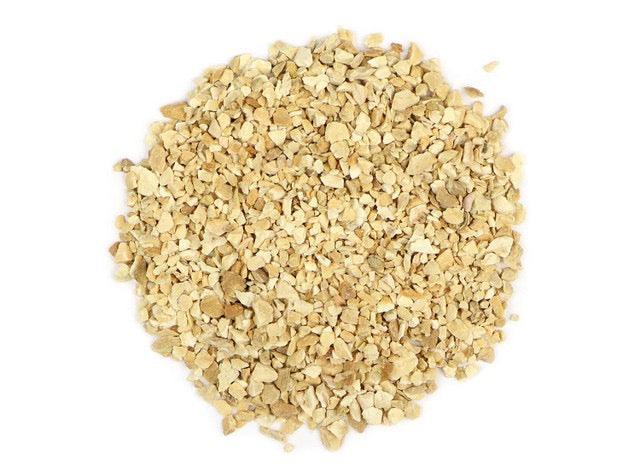Organic Orris Root (Iris germanica)
Herbs are Sold By the Ounce, Price is Per Ounce
Orris Root (Iris germanica / Iris pallida / Iris florentina)
Family:
Iridaceae
Common Names:
Queen Elizabeth Root, Iris Root, Florentine Iris
Origin:
Native to the Mediterranean region, particularly in Italy, Greece, and North Africa.
Parts Used:
Rhizome (root)
Habitat:
Orris root is cultivated in temperate climates, thriving in well-drained soil with full sun to partial shade. It is commonly grown in USDA zones 3-9.
History and Folklore:
Orris root has been used for centuries in perfumery, medicine, and cosmetics. In ancient Rome and Greece, it was valued for its fragrance and medicinal properties. Orris root was often used in love spells and potions during the Middle Ages, as it was believed to attract love and bring about good fortune.
Metaphysical Properties:
Orris root is associated with love, protection, and divination. It is often used in sachets, powders, and incense for attracting love and enhancing psychic abilities.
Botany:
Orris root comes from the rhizomes of the iris plant, particularly the species Iris germanica, Iris pallida, and Iris florentina. The plant features sword-like leaves and large, showy flowers in various colors, typically blooming in late spring. The rhizomes are harvested, dried, and aged to develop their fragrance.
Growing and Harvesting:
Orris root plants are grown from rhizomes, which are planted in the late summer or early fall. They prefer well-drained soil and a sunny location. The rhizomes are harvested after 2-3 years, when their essential oils are most potent. After harvesting, the roots are peeled, dried, and aged for up to five years to develop their characteristic violet-like fragrance.
Constituents:
- Irone: The primary compound responsible for the violet-like fragrance of orris root.
- Myristic Acid: A fatty acid with anti-inflammatory and antimicrobial properties.
- Tannins: Compounds with astringent properties, useful in treating skin conditions.
- Starch: Provides a soothing and protective quality when applied to the skin.
Energetics:
- Temperature: Cooling
- Taste: Bitter, Astringent
Medicinal Actions:
- Anti-inflammatory: Reduces inflammation, particularly in the skin and mucous membranes.
- Astringent: Tightens tissues and helps reduce excessive secretions.
- Expectorant: Helps clear mucus from the respiratory tract.
- Digestive Aid: Traditionally used to soothe the digestive system and relieve bloating.
System Affinities:
- Respiratory System: Used in treating coughs, bronchitis, and colds.
- Digestive System: Helps soothe digestive disturbances such as bloating and gas.
- Skin: Applied topically, it can be used to treat minor skin irritations and reduce inflammation.
Uses:
- Perfumery: Orris root is widely used as a fixative in perfumes and potpourris due to its long-lasting fragrance.
- Cosmetics: Incorporated into powders, creams, and lotions for its fragrance and skin-soothing properties.
- Herbal Sachets: Used to attract love and enhance psychic abilities in spiritual practices.
- Tea: Orris root tea can help soothe respiratory issues, though it is used sparingly due to its potency.
- Poultice: Applied topically for its anti-inflammatory effects on the skin.
Cautions:
- Allergies: Some individuals may be sensitive to orris root; use with caution if you have a known sensitivity to irises.
- Internal Use: Orris root should be used internally with caution and in small amounts due to potential toxicity in large doses. It is primarily used for external applications.
Scientific Studies:
- A study published in the Journal of Natural Products identified irone as the key fragrance compound in orris root, highlighting its significance in perfumery.
- Research in Planta Medica demonstrated the anti-inflammatory properties of orris root extracts, particularly for skin conditions.
- A study in Journal of Ethnopharmacology explored the traditional uses of orris root in respiratory and digestive disorders, confirming its historical medicinal applications.
This product has not been evaluated by the FDA and is not meant to treat, cure, or diagnose any ailment. Please always consult your doctor before adopting new herbal or skincare regimens, especially in cases of pre-existing conditions, pregnancy, or breastfeeding.

